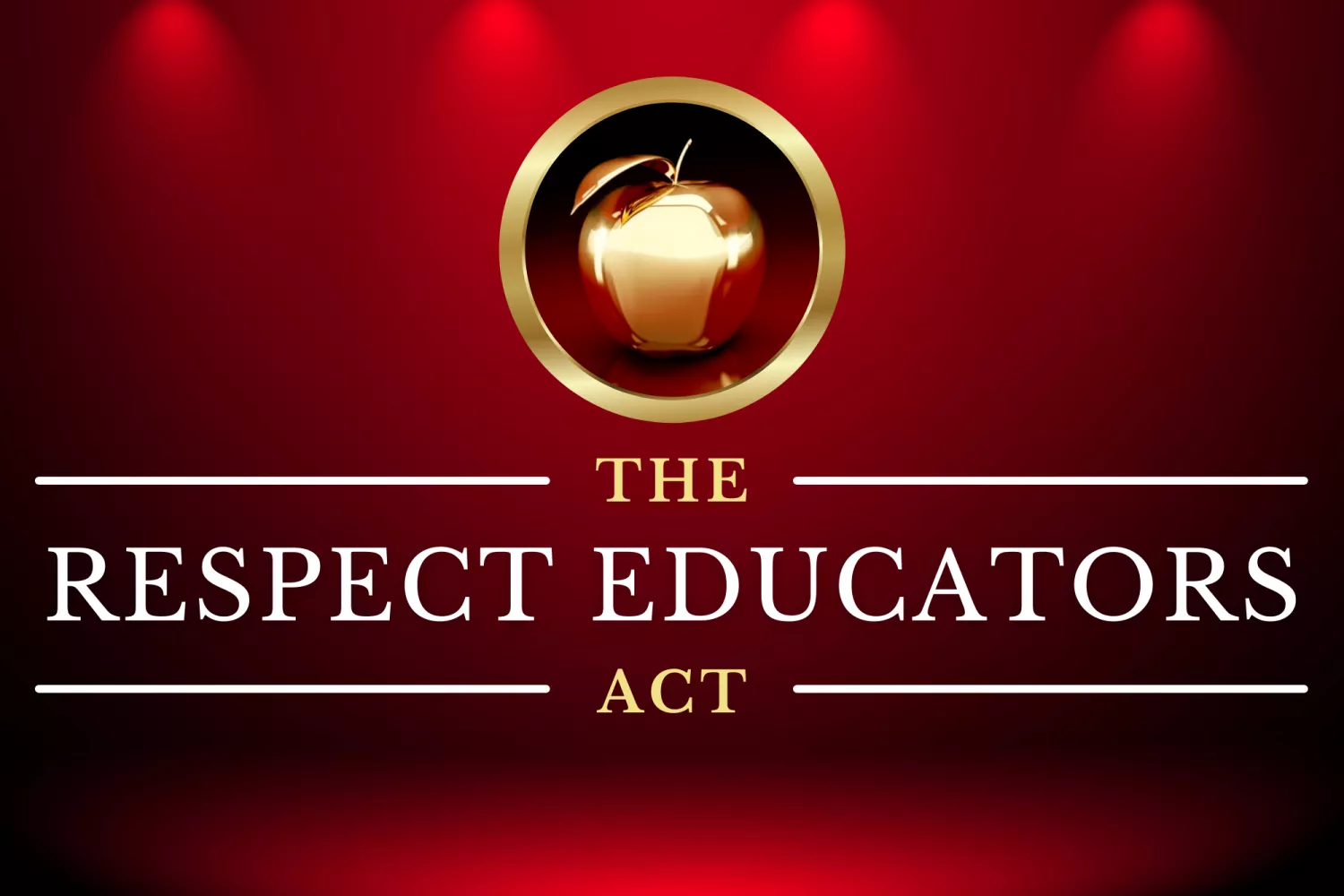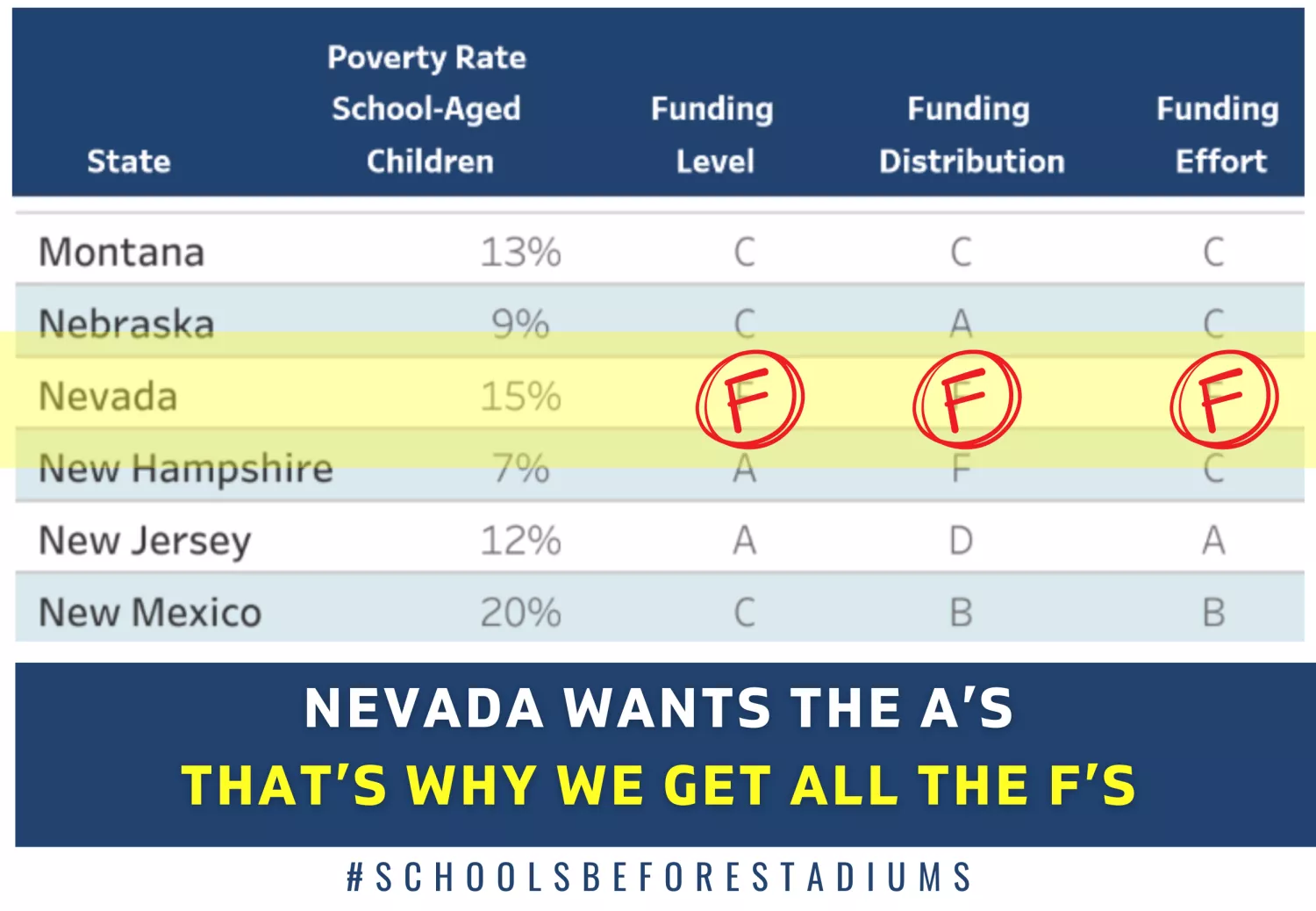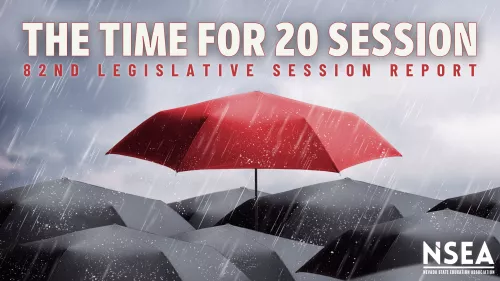Key Takeaways
- Pay: While the legislature did not pass a bill to meet all the demands of Time for 20, they did adopt a budget with a 21.4% increase in base funding for neighborhood public schools for the biennium. They also passed SB231, appropriating $250M in one-time, matching funds for educator raises. The net result of this action is that most Nevada school districts will have the resources available, so we can bargain for at least 20% raises in the upcoming biennium.
- Safety: NSEA also took on the issue of educator safety and voice through our Respect Educators Act. This resulted in the passage of AB285, which struck an important balance between ensuring educator safety through progressive student discipline, while also maintaining the overall framework of restorative justice. NSEA also forced amendments to AB400, to strengthen Nevada’s overall student discipline system, while maintaining educator authority to temporarily remove a disruptive student from a classroom or other school premises.
- Keeping Public Money in Public Schools: NSEA also enjoyed a major win in beating back a proposal by Governor Lombardo to make the largest ever increase in private school vouchers in Nevada. As introduced, AB400 would have stepped up “Opportunity Scholarships” to hundreds of millions of dollars per year and created the Office of School Choice. Even though a competitor union sponsored this bill, we beat it back, forcing the removal of all language related to private school vouchers from the bill.
Overview
Members of NSEA’s ground team tracked 193 bills, with 28 of 66 bills we supported passing out of the legislature and 21 of the 27 bills we opposed failing. NSEA ground team and member leaders were a regular presence during the session testifying in committee. We submitted exhibits on 47 bills and budgets, updated on NSEA’s bill tracker, and made in person public comment on many other items.
In addition to Time for 20 and wins on student discipline, NSEA scored several important victories for educators and students during the session. Highlights include:
- $10M appropriation for school supply reimbursements for teachers and instructional support personnel.
- Creation of the Advisory Committee on the Safety and Well-Being of Public School Staff.
- Expansion of the Teacher Recruitment and Retention Taskforce to include education support professionals.
- Further streamlining student assessments by eliminating the requirement for end of course exams.
- Including 6-year-olds in school attendance requirements.
- Required audits of school districts by the State’s legislative auditor.
- A ruling forcing CCSD to comply with contract language during the employee surplus process.
- Agreement with PERS on parity for education support professionals for accrual of service credit.
Time For 20

NSEA’s Time for 20 was so ubiquitous, it’s fair to say the 82nd Legislative Session was the Time for 20 Session. While critical components of Time for 20 were not met, including an aggressive goal to reduce class sizes to 20 students, legislators spent much of their time talking about the “historic” increase to public education. While NSEA believed more should have been done, base funding for neighborhood public schools was increased by more than 21% over the biennium, and SB231 will make matching funds available to school districts for educator raises. Taken together, most Nevada school districts should have enough resources available for our bargaining units to negotiate 20% raises over the next biennium. This is a huge stride forward from the launch of Time for 20 early in 2022, when most state leaders and elected officials pushed back against the campaign with the chorus, “How are we going to pay for that?”
When first introduced, Time for 20 was ahead of the curve on the issue of educator compensation, working conditions, and vacancies. However, by the time the session arrived, with thousands of educator vacancies across the state, legislators and state leaders were jockeying with each other for position on the issue. NSEA kept up significant pressure throughout the session. Working together with the National Education Association, NSEA launched the Time for 20 Ambassador program as well as a paid media component pushing Time for 20. Ambassadors engaged in public comment, wrote op-eds (This is Reno, NV Indy), were featured in moving news stories, helped organize our Rainy Day rallies, and were especially active in social media. Our paid media campaign delivered over 7M impressions during the session, including 3 online videos produced with NSEA members and students with Youth Theatre Carson City (Let’s Do This, It’s a Rainy Day in Nevada, No More Kids in the Hall).
As we neared the end of the legislative session, NSEA mobilized nearly 1000 educators and supporters in front of the legislature, umbrellas in hand, to say It’s a Rainy Day in Nevada, and calling on legislators to fund Time for 20. This was one of the largest rallies at the Legislature in recent memory. NSEA also generated thousands of emails into legislators in support of Time for 20 and on related bills. We produced another video with footage from the rally (It’s a Rainy Day in Nevada Rally) along with a couple fun weather reports promoting Time for 20. (The Weatherman, The Weatherman Part 2)
While Time for 20 was a great success, the Legislature came up short in a few key areas. First, NSEA’s bills to fundamentally address class size failed to receive a hearing. Also due to issues with the school funding formula, a handful of Nevada school districts will not share in the large increases in education funding. Also, even though K-12 spending was increased by more than $2000 per student, Nevada would need to invest another $4000 per student to reach optimal funding. Finally, as we pointed out time and time again, instead of doing more to close this funding gap, state leaders decided to overinflate reserves. When combining the Education Stabilization Account with the state’s Rainy Day Fund, reserves could approach nearly $3 billion next biennium, 7 times the state’s previous high of $401 million.
Respect Educators

NSEA worked with Assembly Democrats on AB285 to strike an important balance between ensuring educator and school safety with progressive student discipline, while also maintaining the overall framework of restorative justice. AB285 includes language to authorize the suspension, expulsion, or permanent expulsion of a student who commits a battery or assault against an employee of a school, but also provides a student removed from a classroom for more than 2 days with the option to receive education and support services in an in-person setting. This language reflects NSEA’s initial position on AB168 in 2019, especially in cases when a student is a threat to a teacher. NSEA also forced amendments to AB400, Governor Lombardo’s proposal, to strengthen Nevada’s overall student discipline system, while maintaining educator authority to temporarily remove a disruptive student from a classroom or other school premises. Meanwhile, the passage of NSEA-sponsored AB72 creates the Advisory Committee on the Safety and Well-Being of Public School Staff. This Committee includes teachers and education support professionals who will be able to make official recommendations regarding the safety and well-being of public school staff along with the consistent implementation of student discipline
High-profile school violence events are not new and not limited to El Dorado High School in 2022 or the 2013 shooting at Sparks Middle School. NSEA has consistently heard alarming concerns about personal safety from our members across the state. That’s why we have a long history of engagement on the issue of educator safety and student disciplinary practice. NSEA spearheaded the creation of the progressive student discipline system decades ago and during the 2019 session, we were the only stakeholder group raising public concerns about the implementation of restorative justice in AB168.
Since the pandemic, the situation in schools has deteriorated. The pandemic exacerbated mental health issues. And a historic educator shortage, with thousands of vacant positions across the state in addition to the structural shortage with the largest class sizes in the country, makes it nearly impossible to implement even the best plans for school safety and student discipline. Unfortunately, AB168 had a delayed and poor statewide implementation leaving many schools and school districts unsure about the student discipline system, opting for little to no student discipline at all. Educators coined the phrase “restore at the door” to describe the approach many administrators have taken, opting to send disruptive students back into classes after a brief conversation in the hall. This has only made classrooms and schools less safe.
Educator Retention
While there rightfully has been a great deal of focus on teacher vacancies, Nevada schools also face a record shortage of education support professionals, a critical component of the family of educators in our schools. Students have a range of needs that must be met for learning to take place. Transportation professionals make sure our kids arrive safely in the morning. Nutrition professionals make sure no child is trying to learn on an empty stomach. Custodial and maintenance keep the learning environment clean and safe. Tech professionals do the necessary task of keeping our students online. Paraprofessionals tirelessly support students in their learning. Clerical support staff do about 30 different jobs making sure schools run smoothly.
Over the past two years, Nevada school districts have tried to weather an unprecedented shortage of education support professionals, including bus drivers, food service workers, and paraprofessionals. Due to this crisis, many districts greatly reduced services like student transportation. Shortages of paraprofessionals compound problems related to teacher vacancies, compromising learning in the classroom. The crisis is continuing – today the Clark County School District lists nearly 500 vacant support professional positions with another nearly 200 in Washoe.
NSEA raised this issue at the Interim Education Committee last summer, proposing the model of the Teacher Recruitment and Retention Task Force to address the very real issue of recruitment and retention of education support professionals. Instead of creating a new committee, SB71 expands the Teacher Recruitment and Retention Taskforce to include education support professionals. This will add an important voice to this work and ensure recommendations are back to the legislature for improvements on ESP recruitment and retention.
Public Education, The Great Equalizer
Public schools are available to every child, and that’s where 90% of Nevada students are educated. A high- quality public education system helps address inequalities in opportunity and disparities in resources across families and communities. Efforts to defund public schools are directly related to calls to allow public resources to pay for private schools or privately-operated charter schools exacerbating inequality.
Backroom dealmaking at the end of the 2021 Legislative Session led to the giveaway of millions of dollars in public funds to those profiting from education, including unaccountable charter schools and private schools. This deal included an additional $5M for Opportunity Scholarships, backdoor vouchers for private schools, while also deleting language we won in 2019 to phase out the program.
With the election of Joe Lombardo, Nevada was subject to a new push to expand private school vouchers. The Governor introduced AB400, which would have fundamentally compromised K-12 public education in Nevada, with a massive expansion of private school vouchers and the creation of the Office of School Choice to facilitate this expansion. AB400 proposed increasing private school vouchers to .5% of the education budget over the next two years. This is equivalent to about a $20M annual increase. The bill then proposed to step up this funding to reach 5% of the education fund by 2032, meaning hundreds of millions of dollars per year would be diverted from public education. Initial language in AB400 sought to expand voucher eligibility to 500% of the poverty level and create the Office of School Choice with an executive director position to oversee this backdoor voucher scheme.
While a competitor union sat alongside the Lombardo administration to present the bill, NSEA pushed back forcefully. We made it clear transferring more public tax dollars to private schools is the wrong answer and always will be. Instead, Nevada should invest every available dollar to improve our public schools, available for every Nevada student. Resources are necessary to address the challenges our public schools face, including the crisis over overcrowded classrooms and educator vacancies. NSEA was successful at stalling AB400, ultimately forcing an amendment to strip the bill of all references to private school vouchers.
More Learning, Less Testing
A top concern of classroom educators has been too many tests shifting the focus in the classroom away from student learning toward a culture of high-stakes testing. NSEA has been actively working to reduce the burden of standardized testing, helping pass a bill to require reviews of student assessments in 2017 and again in 2021. This session, NSEA supported the passage of SB9 to eliminate the requirement for end-of-course finals from statute. We see this as another small step toward streamlining student assessment requirements and relying on the professional judgment of classroom teachers.
Member Rights
As the representative of teachers and other licensed educators and education support professionals across the state, NSEA is committed to the well-being and protection of our members. This includes safety and rights in the workplace, our collective bargaining rights, access to life’s necessities like healthcare and security in retirement, and educator voice on decisions impacting us.
A longstanding issue for NSEA is equity in the accrual of retirement benefits for education support professionals who work the full school day and school year. During the session, NSEA worked closely with PERS on this issue and was able to come to an agreement on parity for education support professionals for the accrual of service credit. While we did not pass a bill to enshrine this in statute, we will continue to work with PERS to ensure districts accurately reflect the full-time work of ESPs, so there is equity with licensed professionals.
Education Support Professionals are a critical component of the family of educators in our schools and deserve fairness in the transfer and reassignment process. NSEA worked on a trio of bills to ensure negotiated contract language is followed during the surplus process at the Clark County School District. During the legislative session, we won our case at the Supreme Court on this issue, making the passage of clarifying language less critical. However, language was passed codifying this provision in statute.
NSEA takes pride in engaging our members in the democratic process. This includes participating in school board elections. Another serious attempt was made this past session to take away elected school board members. NSEA worked in a coalition to push back against this proposal. In the end, we were successful in defending the elected school board seats. However, opponents were able to add non-voting, appointed seats to the Clark County School District Board of Trustees.
The Work Ahead
While neighborhood public schools are set to receive more than a 20% increase over the next biennium, record educator vacancies and the lack of investment and record inflation over the last few years blunt the impact of these increases. While per pupil funding was increased by more than $2000, this was only one-third of what was needed to reach optimal funding. This gap could have been closed further, but the Legislature instead chose to overinflate reserves. Further, the Commission on School Funding recommended new revenues for Nevada to reach optimal funding over the next 10 years, but the Legislature failed to take up these proposals. The fight for optimal education funding will continue into the foreseeable future. Parallel to this issue, Nevada class sizes are the largest in the nation, and the only bill to effectively address this issue this session failed to receive a hearing.
Educator voice in the classroom and at the worksite means guaranteeing educators have their professional judgment and discretion respected by school and district administrators; are treated with civility and respect; are not required to complete excessively burdensome paperwork; are afforded adequate time during the work week for lesson planning and collaborations with other teachers; have greater autonomy regarding student grading; are able to better enforce student attendance requirements; and have fair work evaluations. Bills to address several of these issues failed to pass this session.
The second special session to entice the development of a ballpark proved two points about the current state of Nevada politics.

First, a majority of state leaders have misplaced priorities shown by their giveaway of $380M in public funds to California billionaire to build a stadium in Las Vegas for the Oakland A’s, executed over the objections of NSEA and our allies who pointed out Nevada was the only state in the country to receive 3 F’s in education funding in the 2022 “Making the Grade” report released by the Education Law Center. We forcefully pointed out while Nevada wanted the A’s, our schools keep getting the F’s. However, this session also made it clear that most people agree Nevada should prioritize the needs of everyday Nevadans, especially public education, over giveaways of public dollars. The special session that was limited to discussing a new ballpark, was as much about Nevada’s level of commitment to public education. This was reflected in testimony during the special, in legislator comments, and even in the national press. NSEA needs to continue to build our coalition to prioritize public education and to elect leaders, like our member Selena La Rue Hatch who led the opposition to the stadium deal.
